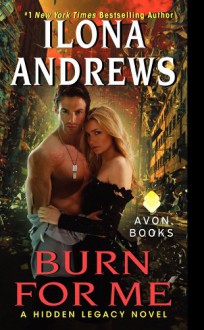I got super sick last week and read a half dozen trashy and less trashy PNR/UF books to salve my soul. Also, I managed to tear through all of the Mercy Thompson books, so I'm a little at loose ends as far as light reading goes. I hit a lot of different series to try them out, and next up is Ilona Andrews.
Turns out, Ilona Andrews a husband and wife writing team, which is fascinating, because they do an amazing fucking job. I started with Burn for Me, because it was on my ereader for some reason (see, a theme!) Burn for Me is the start of a new series, different from the Kate Daniels series that put them on the map. In this world, people who took a serum to activate magical talents a hundred years ago have been intermarrying to shore up the money and power amongst themselves. They are basically unaccountable to anyone, for anything. You know, like our world, but slightly more metaphorical. The main girl is a PI, who is called in to take the fall for a son of wealth and power gone rogue.
I rarely actually laugh while reading, because I have a black black heart, but I did here, multiple times. Andrews is clever and funny, and utilizes a vocabulary typically unseen in urban fantasy. Burn for Me is definitely more on the urban fantasy end, so the growly love interest person isn't anywhere near the most important character, more's the better. The PI has a complex, loving, and exasperating family who are in the business with her, and they get in the way and help out in equal measure.
I'm also fairly confident that Burn for Me pretty much smashes the Bechdel test, which is also notable for a lot of paranormal romance (or actually just regular romance.) So, the Bechdel test is this thing where you ask if 1) there are two women with names and 2) if they talk to each other 3) about anything other than a man. There's a lot of problems with how the Bechdel test gets used, not the least of which is that of course failing the test is not an indicator of either poor quality or anti-feminist writing. I think its main utility is in broad genre statistics: how often does a particular set of writings tell the stories of women that do not hinge on the men in their lives?
PNR fails this test a lot, a lot, partially for the very obvious and understandable reason that mainstream romance by its very definition deals with romantic relationships mostly between heterosexual couples. (Of course there's M/M romance, but that has its own issues I'm not getting into right now.) So of course ladies talk to dudes, and when they talk to their lady friends, they talk about dudes. So far so good.
But really, PNR often takes this one step further, where there is often only one female character in dozens of guys (which you can see in everything from Mercy Thompson to the Black Dagger Brotherhood). If there is another female character, she's slagged as a slut or something, in opposition to the shiny, shiny perfection of the heroine. So it was just lovely to see a family unit of mostly women enacting real relationships that didn't necessarily have anything to do with the love interest. They had money problems and argued about who got the car and who was going to set the table. About how they were going to do their jobs. Just, my heart swells.
Next I hit Magic Bites, which has to be one of Andrews's first novels (weirdly, a theme in my reading recently: start with later stuff and work back.) Not as accomplished as Burn for Me in terms of prose style, but still a damn fine novel, with an absolutely dynamite world to play around in. Kate Daniels lives in an alternate present where magic is swinging back into dominance, and the ascendance of either tech or magic happens randomly and without warning. The vacillation toward magic in the last 15 whatever years means that skyscrapers are falling down, and all of our magical technology is going dark. It's technically a mid-apocalyptic world, which O, baby.
Kate is something between a PI and a bounty hunter, magically inclined. A father figure from her childhood, who works for the magical Order keeping magical shit in check, turns up dead, and she drives into a crumbling Atlanta to find his killer. It's one of those stories where she keeps getting the shit kicked out of her and running down blind alleys, but her general competence and grit gets her through. Something like magic noir. Reader, I enjoyed it greatly. I'm definitely gulping down the rest of this.

 Log in with Facebook
Log in with Facebook 




 The “Bechdel test” for female representation in films is now widely known. To pass it a film should contain two named female characters who have a conversation about something other than a man. In recent years, similar tests have been proposed for other under-represented groups, including the Mako Mori test for characters of colour, and the Russo test for queer characters. What are the strengths and weaknesses of such tests? How do they affect our viewing choices? And what does the popularity of such tests say about how popular media are being received and discussed?
The “Bechdel test” for female representation in films is now widely known. To pass it a film should contain two named female characters who have a conversation about something other than a man. In recent years, similar tests have been proposed for other under-represented groups, including the Mako Mori test for characters of colour, and the Russo test for queer characters. What are the strengths and weaknesses of such tests? How do they affect our viewing choices? And what does the popularity of such tests say about how popular media are being received and discussed?





